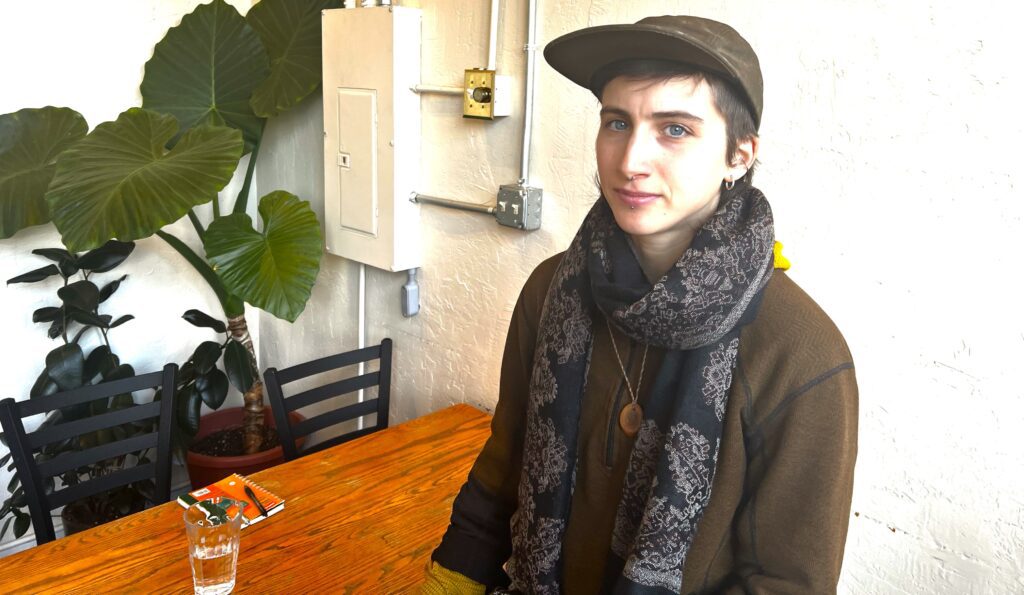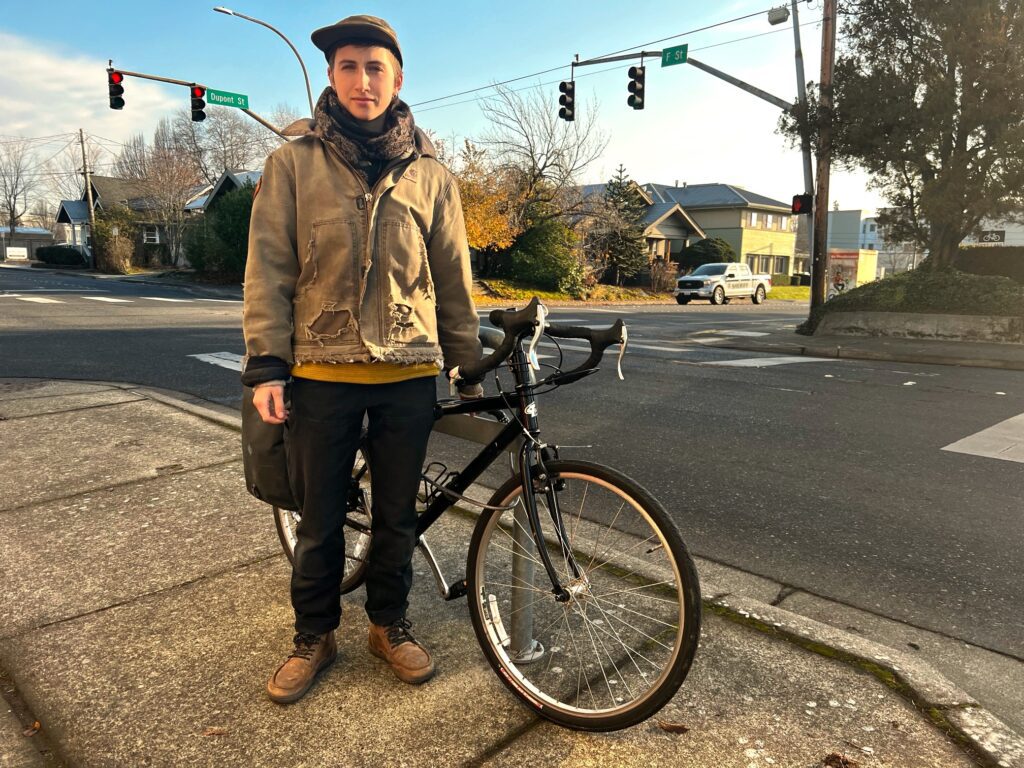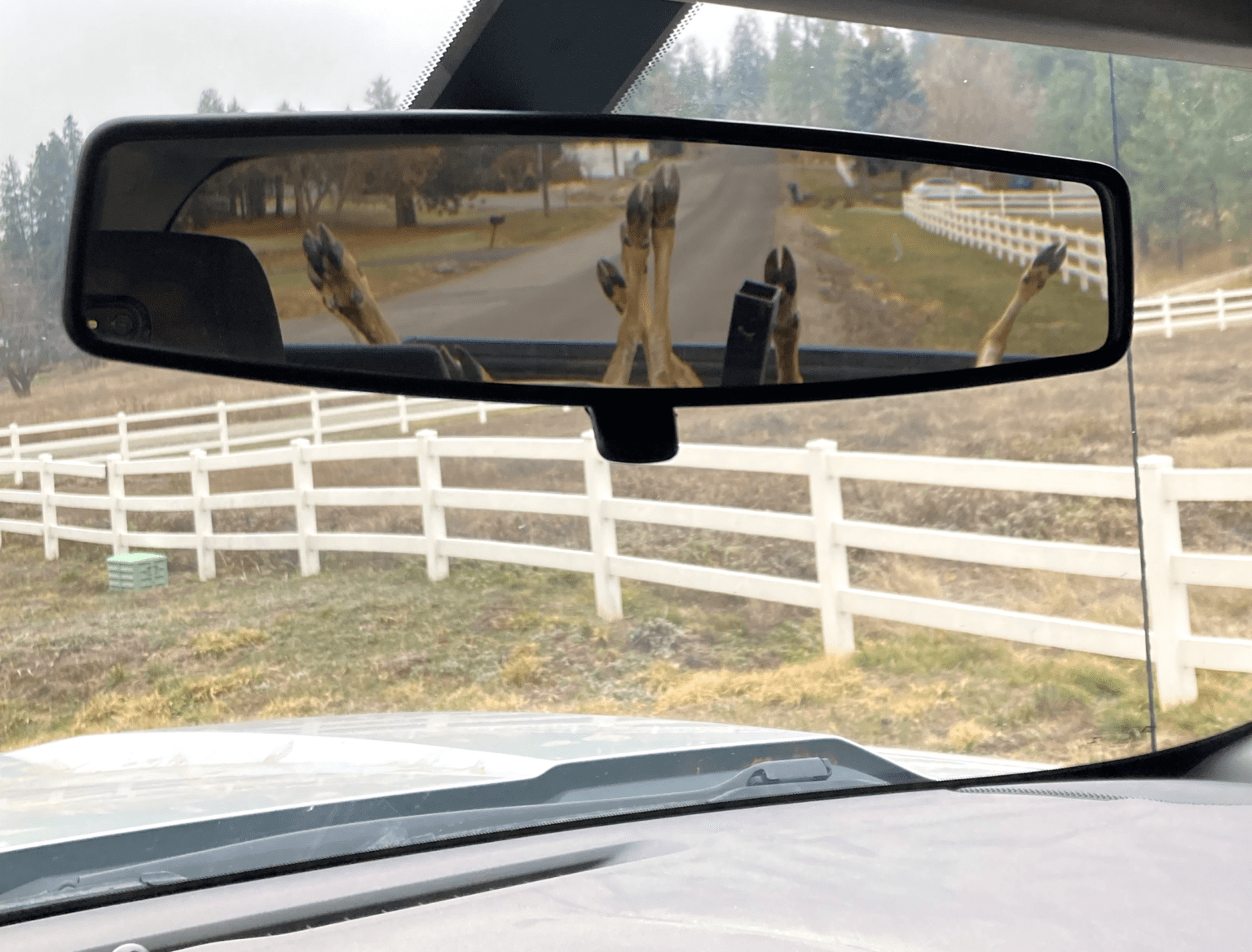Most of us have seen poor little critters on the road smashed, bashed or otherwise mutilated. Roadkill, it seems, is a gruesome byproduct of the automobile age.
So, it was heartening to meet Bellingham newbie Kai Wians, aka “Kai.ote Jack.” We recently spent a morning at Lettered Streets Coffeehouse talking about roadkill harvesting and honoring animals who have perished on the highways through no fault of their own.
Wians, 26, is mastering the art of roadkill harvesting for food and providing community service. Wians is one of thousands of Washingtonians who obtain permits to collect freshly killed deer and elk.
“Harvesting roadkill is a fantastic way to create sustenance for ourselves, and to honor the animal and honor the place where we are living,” said Wians, who grew up south of Chicago.

State officials reported an increase in animal-vehicle collisions in recent weeks because of less daylight, distracted ungulates during rutting season and wildlife migrating to lower elevations for the winter.
The likelihood of an animal involved in a collision claim in Washington is one in 286, according to State Farm Insurance data for 2022-23. We rank 44th in the United States for such claims.
Still, thousands of animals die on state roads each year. In 2022, the Washington State Department of Transportation (WSDOT) estimated a deer-vehicle collision cost, on average, $14,014 per incident, or more than $187 million annually.
State and local government agencies handle most roadkill removals. For example, WSDOT maintenance crews dispose of animals on state highways and bury carcasses at designated sites.
The idea of salvaging roadkill took root in 2016 when a group of Washington hunters saw a dead elk on the side of a Utah highway. They talked about how they could have picked it up in Montana, where harvesting roadkill was legal.
The group included Jay Kehne, then a Washington Department of Fish and Wildlife commissioner. He recalled his buddies asking why Washington didn’t allow salvaging carcasses as some other states.
Kehne returned from the trip determined to create a system modeled after Montana’s. The policy began on July 1, 2016, solely for deer and elk hit by motor vehicles. Washington is one of 30 states allowing the practice.
Salvagers are required to take the entire carcass and print a free permit from the WDFW website within 24 hours. Fish and Wildlife staff also ask them to test carcasses for chronic wasting disease.
The policy prohibits roadside harvesting of deer in Clark, Cowlitz and Wahkiakum counties, where the federally protected Columbian white-tailed deer live.
“It meant a lot of unused deer carcasses along the highway could be used for a better purpose,” Kehne told me. “If we don’t pick them up, the public pays for someone to throw them in a dump pile somewhere and let them rot away.”
During the first full six years of legal salvaging, harvesters removed 4,876 deer and 1,584 elk, WDFW data shows. The numbers represented 18% of total deer carcass removals and 63% for elk.
The state tracks salvaging permits with an interactive map. In the past two years, the agency issued 10 permits to harvesters in Bellingham along state Route 542 from the interstate to Van Wyck. Salvagers took another five deer along Alabama Street. (The final data was not available for 2023; numbers and locations of salvages are subject to change).
And almost 50 permits have been issued to harvest roadkill on state Route 20 from Sedro-Woolley to Concrete since 2021.
The numbers decrease significantly in more rural sections of highways, WDFW data shows.
Kehne, who lives in Okanogan County, said salvaging roadkill isn’t for everyone. It seems most harvesters are hunters used to butchering wild game.
Fish and Wildlife offers guidelines to handle dead animals, but Kehne said temperature is the main issue.
“Any deer in July is not worth taking a risk,” he said.
Ultimately, Kehne said, it’s a judgment call whether the meat is safe.
Carrion — the remains of dead animals — is scavenged by hawks, eagles, ravens, vultures and coyotes. It’s not for human consumption and gives roadkill harvesting a bad name.

Wians, a part-time landscaper, learned how to handle animals a few years ago when joining Buffalo Bridge, an ancestral skills-based project in the Methow Valley that promotes buffalo hunting traditions. Wians helped process a cow, then tanned three deer, a sheep and a buffalo.
“I thought it was wrong to kill animals for abundance and sustenance,” Wians said.
But the perspective has changed since learning from people who pay tribute to the dead animal as part of a life cycle.
Harvesting roadkill isn’t difficult, said Wians, who briefly worked as a butcher. The carcasses are hung in the garage and carved with knives. Then Wians freezes the meat.
“Back in the day, what did people use?” Wians said. “The Lummi and Salish harvested deer all the time, and they had amazing tools for it.”
Those unfamiliar with handling wildlife might get queasy with the image of eating roadkill. But it’s a thing. Wikipedia has an entry for roadkill cuisine.
Harvesters cut their meat into steaks, or make hamburger patties, sausages and jerky.
Wians is drawn to roadkill for spiritual sustenance as well as collecting meat. The day before we met, Wians cycled past two squirrels, a rabbit and two birds lying dead on or near a road.
Wians, who doesn’t have a car, likes to give the animals a burial by putting them under a bush or tree. Wians sometimes builds natural altarpieces, such as a stick with lichen.
“A lot of us don’t know how to sit with death and handle death,” Wians said. “A simple burial is something you can do that is just so big.”
Contact Kai Wians at Kaiotejack@gmail.com to report local roadkill to salvage or to help with removal.
The Whatcom Humane Society disposes of roadkill on Whatcom County roadways. Reach the group at 360-733-2080. Skagit County’s Public Works Department clears its roads. Call Skagit County Sheriff’s dispatch at 360-428-3211 to report an incident.
The Facebook group Whatcom & Skagit County Game Salvage posts locations of recent deaths for anyone wanting to harvest meat. One of the group’s administrators is Tim Bento of Lynden, a well-known harvester.
Elliott Almond’s outdoor column appears monthly. Email: elliottalmond4@gmail.com.





